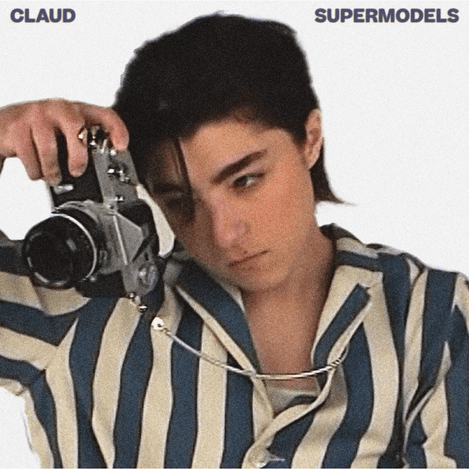Claud returns more self-assured than ever on Supermodels.
"Supermodels"

Broken down by New York’s baleful winter weather, the instruments used to compose the bare bones of Supermodels could barely stay in tune.
And though mostly masked during formal recording, occasionally the vague hum of a key slightly out of step will still ring through, imbuing the record with an irresistible charm. However, though acoustic tonality may appear muddy, the confident voice of Supermodels reigns loud and clear.
There is an essence of transformation that feels inescapable on the record – representative of the shifts in identity, relationships and domestic life that ruptured Claud Mintz’s world after the release of their 2021 debut Super Monster. The artist appears changed for the better, as though this metamorphosis wiped the rose-coloured smears from their outlook on the past.
The Avril-inspired "Every Fucking Time" calls out an ex’s poor excuses, whilst scolding themselves for believing them anyways. Between anecdotes of arguments over Regina Spector and searching for their face in a crowd at a gig, only to realise they failed to appear altogether, the song is a personal take on the universal feeling of disappointment when we release that our efforts in love aren’t always requited.
The hidden gem, "Paul Rudd" is a shimmering projection of the same guitar-driven sound, shortly followed by the lo-fi approach on "Climbing Trees". The latter is perhaps most like the sound of Claud’s previous projects, but its matured production only illustrates how far they have come since escaping the four-walled encasements of bedroom-pop familiar to their early career.
The album’s strengths also lie in its quieter moments. Opener "Crumbs" lingers on “the little things” that make up a relationship’s whole. Produced by Ethan Gruska (Phoebe Bridgers, Ryan Beatty) and featuring his signature subtle distortion, Claud loiters in the memory of an early morning snowed in before its images of ideal domesticity are ultimately disturbed by the lines that follow; “I’d kill for you / I’ve killed for you.”
At its other end lies the album’s final gift, "Screwdriver". Foregrounded by close-miked vocals, the conviction in Mintz’s voice is palpable, as they recount the time they were caught looking at photos of supermodels, “Trying not to cry / When I look back at myself”. Providing the project’s namesake, it’s clear that these images of idealism are often at odds with Mintz’s reality. Though instead of sitting in this despair, busy picking at the faults of our past selves, they ask us to “bury it”, before erupting into an explosive chorus at the record’s final curtain call, indicating that perhaps the worst has been left behind.
Get the Best Fit take on the week in music direct to your inbox every Friday

Tunde Adebimpe
Thee Black Boltz

Julien Baker & TORRES
Send A Prayer My Way

Bon Iver
SABLE, fABLE





